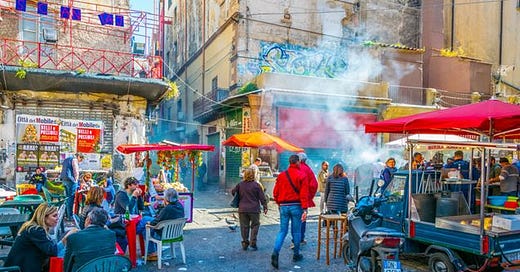If you walk anywhere near my apartment in the Vucciria district of Palermo, you’d better watch your step. I’d share a pic, but it’s just too gross to post. When I open the front door of my building, I immediately see a wall of graffiti, including a hammer-and-sickle. There’s trash all around. Food waste, paper, plastic, and glass. Not just discarded beer bottles; the narrow street features multiple shattered beer bottles. And don’t get me started on the animal waste from all the stray dogs and cats. (Are they strays? Still wondering).
Don’t get me wrong; the same neighborhood also features scores of fantastic (and cheap) restaurants, gelato stands, historic sites, and more. But after a few days, even as staunch a libertarian as myself starts thinking, “Cleaning up this neighborhood is a massive public good. The government needs to tax the residents to fund a permanent herculean clean-up effort.”
You’d have to be awfully dogmatic to disagree, right?
There’s just one tiny problem: Palermo already did that!
For as long as anyone can remember, the Palermitan government has taxed its population to provide trash collection, trash clean-up, animal control, graffiti removal, and much more. The government uses these funds to hire an army of government employees. Yet the streets of Palermo remain filthy. Sporco sporco everywhere!
Getting official Italian statistics on Palermo’s budget is hard, but the Italian economists I’ve talked to assure me that there is ample funding. With overall government spending as a share of GDP at 48% in 2019, this verdict is hard to dispute.
The problem is just that the government lacks follow-through. After taking people’s tax money, they hire government employees, make a token clean-up effort (at best), and call it a day. Che sistema!
There are general public choice lessons. To start: Before you ask the government to act, check to see if it’s already officially acting. Furthermore: Before you advocate a government “solution” to anything, see how well past “solutions” have actually panned out. Use past government behavior - not wishful thinking - to predict future government behavior.
But there is also a specific adage I’d like to extract. Palermo reminds me of several trash-ridden Latin American cities I’ve visited. In each of these countries, a vocal minority advocates socialism to solve their troubles in one fell swoop. And to each of these countries, I say: We can talk about socialism as soon the government successfully cleans up all the trash. Not a day before.
I know that sounds like a dangerous promise, but I’m not worried. Government failure isn’t an ephemeral, transient problem. Yes, some governments are worse than others. Obviously. But the fact that even First World governments often fail to keep their streets clean is revealing. If you can’t trust government with the basics, you are foolish indeed to trust them with anything more.
Subscribe to Bet On It
Caplan and Candor




"If you can’t trust government with the basics, you are foolish indeed to trust them with anything more."
This is true. But I think that you miss another point: which is once you ask a government to do vastly more than the basics, then it pretty much guarantees that not even the basics will be done well. Long ago, we realized that companies should "stick to their knitting" and not become "jack of all trades, master of none" conglomerates. These rules don't just apply to governments, they apply to all organizations.
I made this point (and one other equally important one) in this article.
https://fee.org/articles/a-root-cause-of-covid-failure-big-government-is-both-a-monopoly-and-a-conglomerate/
I've lived in many different countries and have concluded. definitely that government is downstream from culture. I live in Thailand right now an there is virtually no problem with trash or poop on the streets. Homeowners would not allow it. If the street cleaners (humans without machines) decided to pull an Italiano and just hit the coffee shops in midday, homeowners would make sure the area was picked up. I had an Italian roommate in an apt at grad school and he cleaned cooking pans by scraping them out the window. One day when he thought I wasn't looking, I kid you not, he just threw the entire pan out the window.